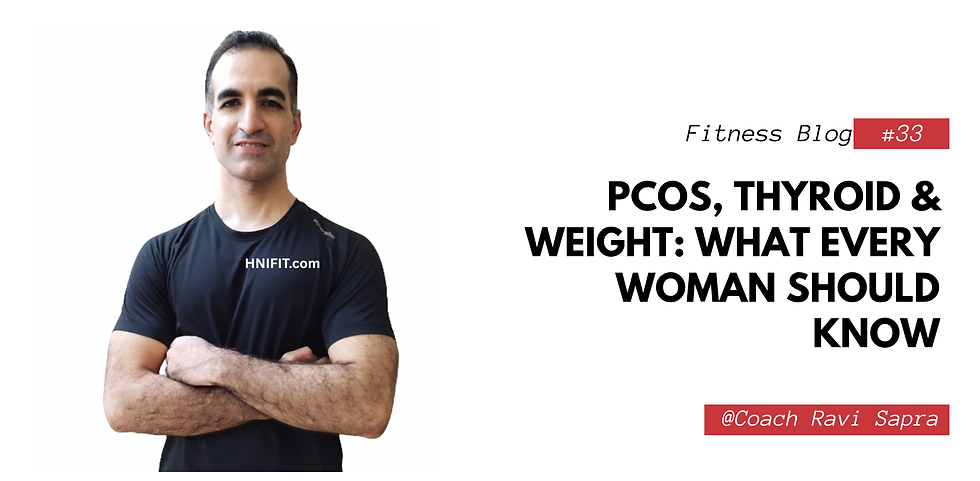PCOS, Thyroid & Weight: What Every Woman Should Know
- Ayush HNIFIT
- Jul 25, 2025
- 4 min read
Updated: Jul 30, 2025
Hormones play a vital role in every woman’s health, especially when it comes to weight, energy, fertility, mood, and overall well-being. Two of the most common yet often misunderstood hormonal conditions affecting women today are Polycystic Ovary Syndrome (PCOS) and thyroid disorders. Both can make weight management feel like an uphill battle, even when you're doing “everything right.”
In this article, we’ll break down what you need to know about PCOS, thyroid issues, and how they affect your weight—and most importantly, how to work with your body, not against it

What Is PCOS?
Polycystic Ovary Syndrome (PCOS) is a hormonal imbalance that affects about 1 in 10 women of reproductive age. It's not just about ovarian cysts—PCOS impacts your metabolism, insulin sensitivity, menstrual cycle, and androgen (male hormone) levels.
Common Symptoms of PCOS:
Irregular or missed periods
Excess facial or body hair (hirsutism)
Weight gain, especially around the belly
Acne or oily skin
Hair thinning or hair loss
Difficulty getting pregnant
Mood swings or anxiety
PCOS is often linked with insulin resistance, meaning the body struggles to use insulin effectively, leading to fat storage and difficulty losing weight.
What Are Thyroid Disorders?
Your thyroid is a butterfly-shaped gland in your neck that regulates metabolism, energy, and hormone production. When it’s not functioning properly, it can affect your weight dramatically.
There are two main thyroid conditions:
1. Hypothyroidism (Underactive Thyroid):
Slows metabolism
Causes weight gain, fatigue, constipation, depression, and sensitivity to cold
2. Hyperthyroidism (Overactive Thyroid):
Speeds up metabolism
May lead to weight loss, anxiety, insomnia, rapid heartbeat, and irritability
Hypothyroidism is more common in women, especially after pregnancy or around menopause, and is often linked to Hashimoto’s disease, an autoimmune condition.
Why Do PCOS and Thyroid Issues Affect Weight?
Hormones like insulin, cortisol, estrogen, and thyroid hormones are deeply interconnected. When any one of them is out of balance, your body may resist weight loss, no matter how hard you try.
Key Reasons You May Struggle with Weight:
Slowed Metabolism: Low thyroid hormone means your body burns fewer calories at rest.
Insulin Resistance: Seen in PCOS, this leads to increased fat storage and hunger.
Inflammation: Both conditions can cause low-grade chronic inflammation, making fat loss harder.
Fatigue & Brain Fog: When you’re tired, you’re less likely to exercise and more likely to crave sugar or comfort food.
Hormonal Cravings: Imbalances can trigger intense sugar or carb cravings.
Stress Response: Cortisol, the stress hormone, often goes hand in hand with both PCOS and thyroid issues—leading to belly fat and burnout.
Understanding the Emotional Impact
Weight gain and difficulty losing weight can take a toll on a woman’s mental health. When paired with symptoms like acne, hair thinning, or irregular periods, confidence and body image can suffer.
It's important to know:
You’re not lazy. You’re not doing it wrong.
These are medical conditions, not character flaws.
With the right plan and support, you can feel better in your body
Nutrition Tips for PCOS & Thyroid
What you eat can have a powerful effect on hormone balance. Here’s how to eat to support both PCOS and thyroid health:
What to Eat:
High-Fiber Veggies
Broccoli, leafy greens, zucchini, bell peppers
Supports digestion, balances blood sugar
Lean Proteins
Eggs, tofu, lentils, beans, Greek yogurt
Keeps you full, supports metabolism
Healthy Fats
Avocados, nuts, seeds, olive oil
Crucial for hormone production
Low-Glycemic Carbs
Sweet potatoes, oats, quinoa, berries
Prevents blood sugar spikes
Anti-Inflammatory Foods
Turmeric, ginger, fatty fish (if non-vegetarian), green tea
Helps reduce hormonal inflammation
Iodine & Selenium (For Thyroid Health)
Found in seaweed (iodine), Brazil nuts (selenium)
Supports thyroid hormone production
What to Limit:
Refined sugars and white carbs
Dairy (may worsen insulin resistance for some with PCOS)
Processed foods with added hormones or preservatives
Excess caffeine or alcohol
Exercise Tips for Hormone Balance
Exercise can be a game-changer—but overdoing it can backfire, especially with thyroid and PCOS.
The Best Types of Workouts:
Strength Training
Builds lean muscle, boosts metabolism
2–3x a week is ideal
Walking or Low-Impact Cardio
Gentle on joints and adrenals
30–45 minutes most days
Yoga or Pilates
Reduces stress and inflammation
Improves hormone response
HIIT (in moderation)
Can help with insulin sensitivity
1–2x a week max, with proper rest
Avoid:
Overtraining or long hours of cardio (can increase cortisol)
Ignoring fatigue—rest is part of the plan!
Medical Support: Tests You Should Consider
If you’re struggling with weight and suspect PCOS or thyroid imbalance, ask your doctor about the following tests:
TSH, T3, T4 (Thyroid function)
Thyroid antibodies (for Hashimoto’s)
Fasting insulin and glucose
A1C (blood sugar control)
Testosterone, DHEA-S
LH:FSH ratio (for PCOS diagnosis)
Ultrasound (to check for ovarian cysts)
Sometimes lifestyle changes aren’t enough on their own—medication, supplements, or hormone therapy may be necessary.
Supplements That May Help (With Doctor Approval)
Inositol (for PCOS & insulin resistance)
Vitamin D (many with PCOS or thyroid issues are deficient)
Magnesium (supports insulin and stress response)
Zinc (for hormone regulation and skin health)
Ashwagandha (adaptogen for thyroid and cortisol support)
Always consult your healthcare provider before starting supplements.
Final Thoughts: Be Kind to Yourself
Managing weight with PCOS or thyroid issues is not about quick fixes or crash diets—it’s about understanding your body’s unique rhythm and working with it.
Progress may be slow, but it’s real.
Rest is just as important as workouts.
You deserve to feel strong, balanced, and supported—no matter what the scale says.
Above all, don’t give up. With the right information, support, and tools, you can take control of your hormones and thrive.
.png)



Comments